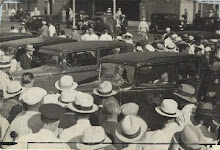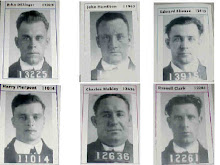In Howard Zinn's "A People's History of the United States" he points to John Galbraith's "The Great Crash" for examples of pre-crash problems:
"...'the economy was fundamentally unsound.'"..."very unhealthy corporate and banking structures, an unsound foreign trade, much economic misinformation, and the 'bad distribution of income'(the highest 5% of the population received about 1/3 of all personal income)."
During the Jazz Age and roaring twenties middle and upper class America were partying as people were becoming consumers, buying various new appliances as farms were generally doing well and unemployment was improving. Air travel arrived, along with newer Cars accessible to the middle class. Appliances like the refrigerator and radios became as desirable as TVs and Laptops today (if you had the money the you had to buy it). And of course the Thompson Machine Gun aka "Tommy Gun" was becoming commercially available to those who 'needed' it.
After the crash, farmers lost their land, the crops wouldn't sell, and they couldn't even legally have a drink to ease their pains. They had a radio in the living room, a car in the barn, and a nice refrigerator to keep their meat cold, but they no longer owned their land. The bank did and I can imagine the farmer and his family were none-too-pleased with the corporate structure snatching their lives (as I'm sure employees weren't pleased to lose their jobs, and therefore their livelihoods at the hands of a crumbling Business). Why not rob a bank? They robbed us. But the big heists would come later, it was a different criminal act that would show the full power of the Tommy Gun and the dark realities of Al Capone's empire.










No comments:
Post a Comment